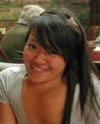Welcome to this edition of Perspectives, the e-newsletter of the
Stanford course, Perspectives in Assistive
Technology.
What
is the course? - Perspectives in Assistive Technology is a
Winter Quarter course at Stanford that explores issues surrounding the design,
development, and use of assistive technology benefitting people with
disabilities and seniors. More information can be found on the course
website.
Invitation to attend - You are invited to attend
all class lectures. They will be held in the
Thornton Center - Classroom 110 on Tuesday
and Thursday afternoons at 4:15 to 5:30pm and are free and open to the
public.
Next class session - Tuesday, January 22nd at
4:15pm:
|

|
Perspectives of Stanford
Students with a Disability
Vivian T. Wong,
Emily Kelly, Morgan Duffy, Fiona Hinze, and Page Ive
Stanford Students |
Abstract: In this
panel discussion, several Stanford students with disabilities will discuss
their academic goals, the assistive technology they use to be successful
students, and the challenges they have faced.
Vivian T. Wong's
Biosketch:
-
Vivian Wong graduated
from Stanford last year with a double major in International Relations and
French. Currently she is working at two education nonprofits in the city, as
part of a public service fellowship through the Haas Center. She was born with
a congenital spinal disorder, called spondylothoracic dysplasia, which
translates to a truncated torso, forward curvature of her spine, limited neck
rotation and reduced lung capacity. From Hong Kong to the Bay Area, her
condition has puzzled many doctors and, to this day, she has yet to meet
someone with the same disability.
-
Due to her limited neck
rotation, she would not be able to drive safely without the use of assistive
technology. The installation of cameras to cover blind spots and pedal
extensions allows her to drive independently.
-
Since her sophomore year,
she's been committed to dispelling the stigma of the anti-normative and
encouraging students with disabilities to advocate for themselves. At Stanford,
she created "Power to ACT: Abilities Coming Together", a student group
dedicated to safe social spaces for students with visible and hidden
disabilities. Throughout college, she became more comfortable with her
disability and welcomes you to ask her anything.
Emi Kelly's
Biosketch:
-
Emily Kelly is a Stanford
Freshman. She comes from snowy Colorado, where she enjoys her family, friends,
Nordic skiing and snowshoeing. At Stanford, she is a member of SURJ, the
Stanford Undergraduate Research Journal, and a competing member of the Stanford
Intercollegiate Bridge Team. She is deeply interesting in how the brain works
and hopes to soon explore the relationship between neuroplasticity and
neurological disorders such as learning disabilities.
-
Emily has Dyslexia and a
Working Memory Deficit. She often finds herself surprised at the surprise
others exhibit when they find out. Thus, she is quietly committed to improving
the conceptions of her community on LD by helping friends with learning
disabilities improve their self-conceptions, and showing that those with
disabilities also have valuable skills to offer. She is excited to start her
second quarter of college and grateful to her family and Stanford for their
invaluable aid and accommodation in relation to her learning
differences.
Morgan Duffy's
Biosketch:
-
Studies and experiences
have lead Morgan to concentrate her work on something essential in her life:
disability. As a woman with a disability, Morgan has traveled to inaccessible
parts of the world to work with children who remind her of her childhood
friends from summer camp. At Stanford she studies Cross Cultural Health and
Policy and has completed internships at Whirlwind Wheelchair, The U.S. Senate
Committee on Health, Education, Labor and Pensions and Stanford Hospital. In
her spare time,Morgan enjoys shopping in open markets, being outdoors, taking
road trips, meeting new people, talking politics and reenergizing with hot
yoga.
Page Ive's
Biosketch:
-
Page Ive is a junior
majoring in Science, Technology, and Society with a focus in IT, Media, and
Society. Disabilities have played a large role in Page’s life because both
she and her older brother have invisible disabilities. Page has attention
deficit disorder (ADD) and dysgraphia, a disability that makes it difficult to
hand-write legibly. Page became involved in the disability community as a
result of the significant impact academic accommodations had on her ability to
succeed. With the use of a computer, she could finally demonstrate her
abilities and was highly motivated to do so. Throughout high school she
volunteered regularly with Northwest Special Families and participated in
several inbound/outbound US / Bahrain exchanges with Mobility International
USA, culminating in her work as a consultant during a professional outbound
exchange. She also applied her passion for theater to disability advocacy by
organizing an accessible theater performance for children. At Stanford, she is
very familiar with the Office of Accessible Education and encourages students
to utilize its valuable resources. This year she joined Power to ACT and is
taking advantage of the opportunity to learn as she creates a website for the
group.
-
In 2010, Page was one of
two recipients of the Anne Ford and Allegra Ford Thomas scholarship, a $10,000
award for her disability advocacy.
|
 |